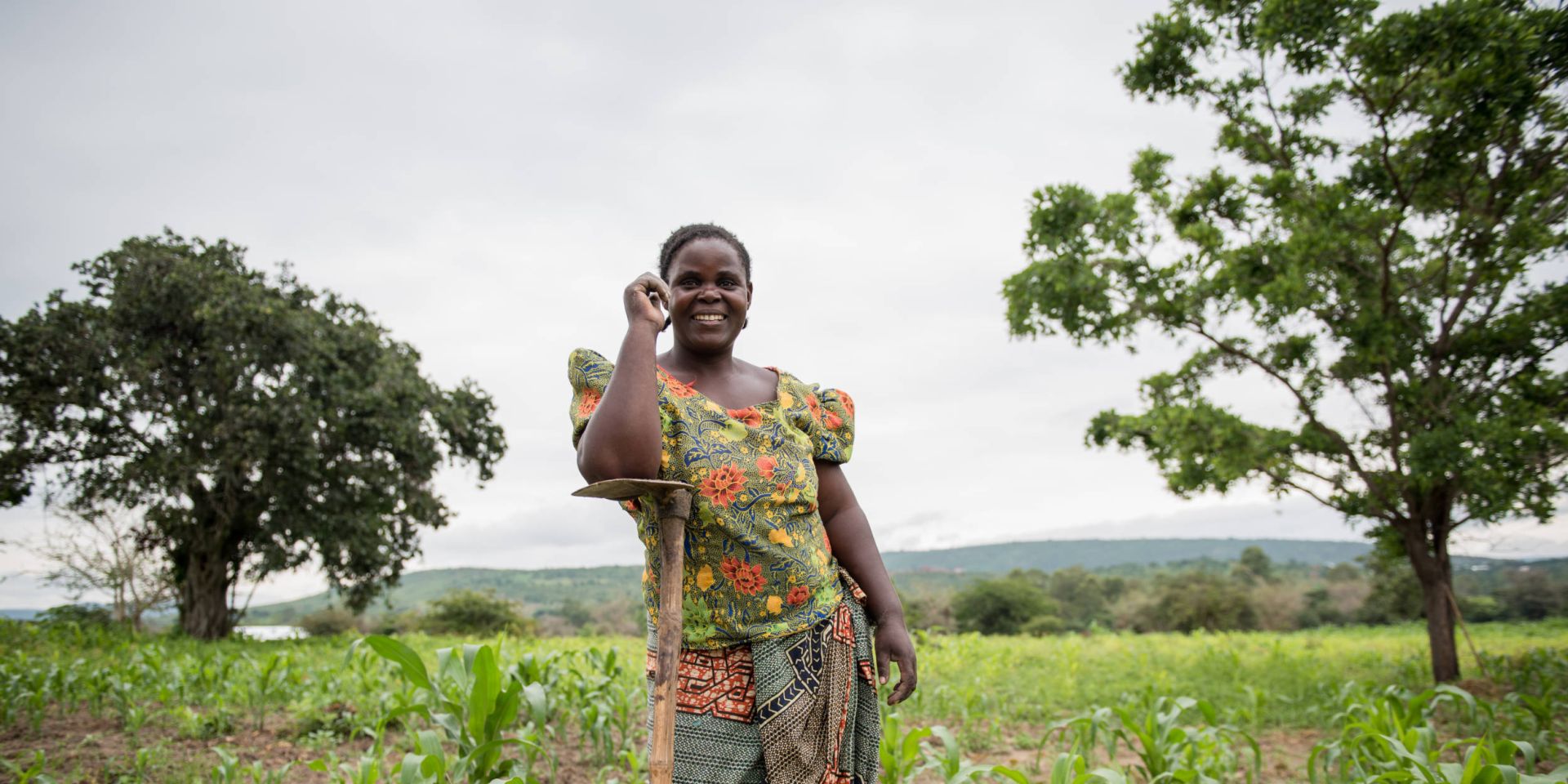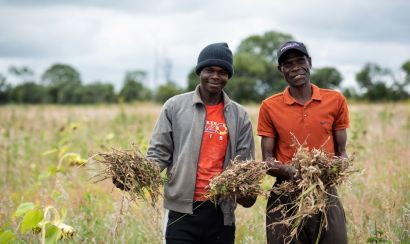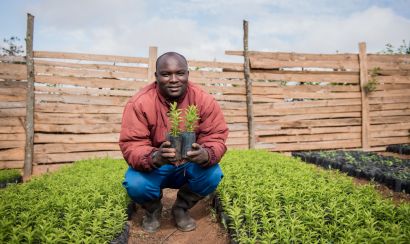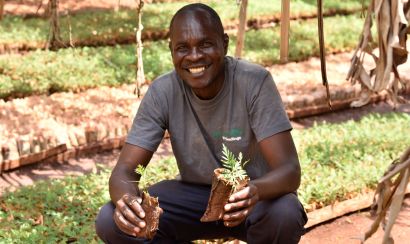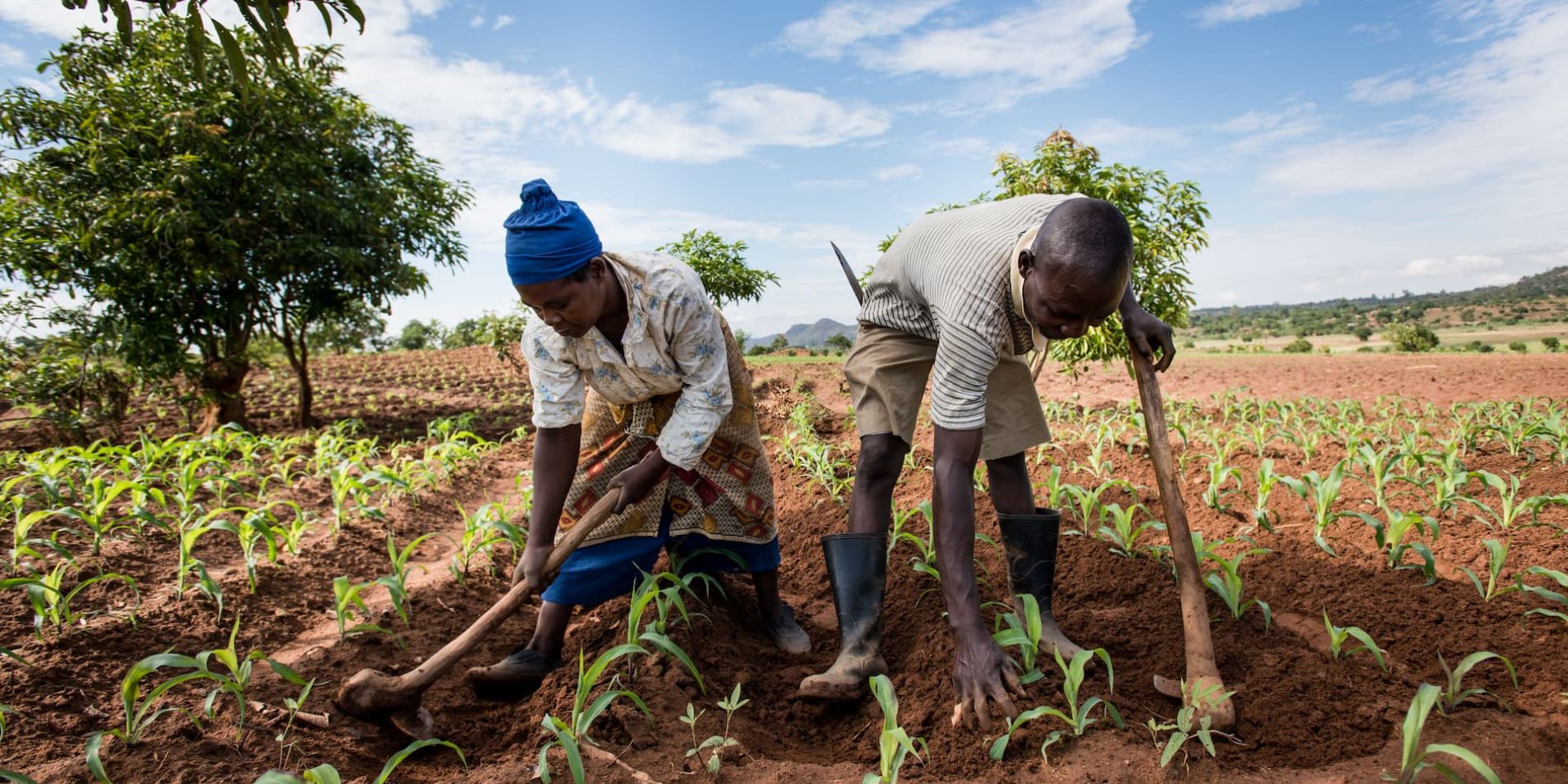Environmental sustainability: committing to farm-level resilience
Sub-Saharan Africa, home to 48 countries and 1.2 billion citizens, is collectively responsible for less than 1% of annual carbon emissions worldwide. In fact, rural African smallholders may be the single global population least responsible for climate change, yet they are among the most vulnerable to its impact – their reliance on rainfed agriculture makes them highly sensitive to changes in rainfall and temperature.
For One Acre Fund, equipping smallholders for greater climate resilience is both an operational imperative and an issue of climate justice. Our model supports farm-level adaptation and mitigation, enabling farmers to sustainably increase their income by reinvesting in their land and local environment.
Below, we are excited to share four priority commitments adopted in 2022 as part of our new 10-year climate strategy, and illustrate how these efforts are already supporting clients in the field.
Commitment 1: We are reliably increasing average farm income by intensifying crop density and diversity.
Crop intensification and diversification are important tools for increasing and safeguarding farm income. Establishing multiple robust income streams helps farmers hedge against climate factors such as erratic weather and pest/disease cycles, and other external shocks like market fluctuations. Planting a variety of crops also improves biodiversity, strengthens local biomes, and improves household nutrition. One Acre Fund offers a wide range of crop inputs and trains farmers on what, when, and how to cultivate them.
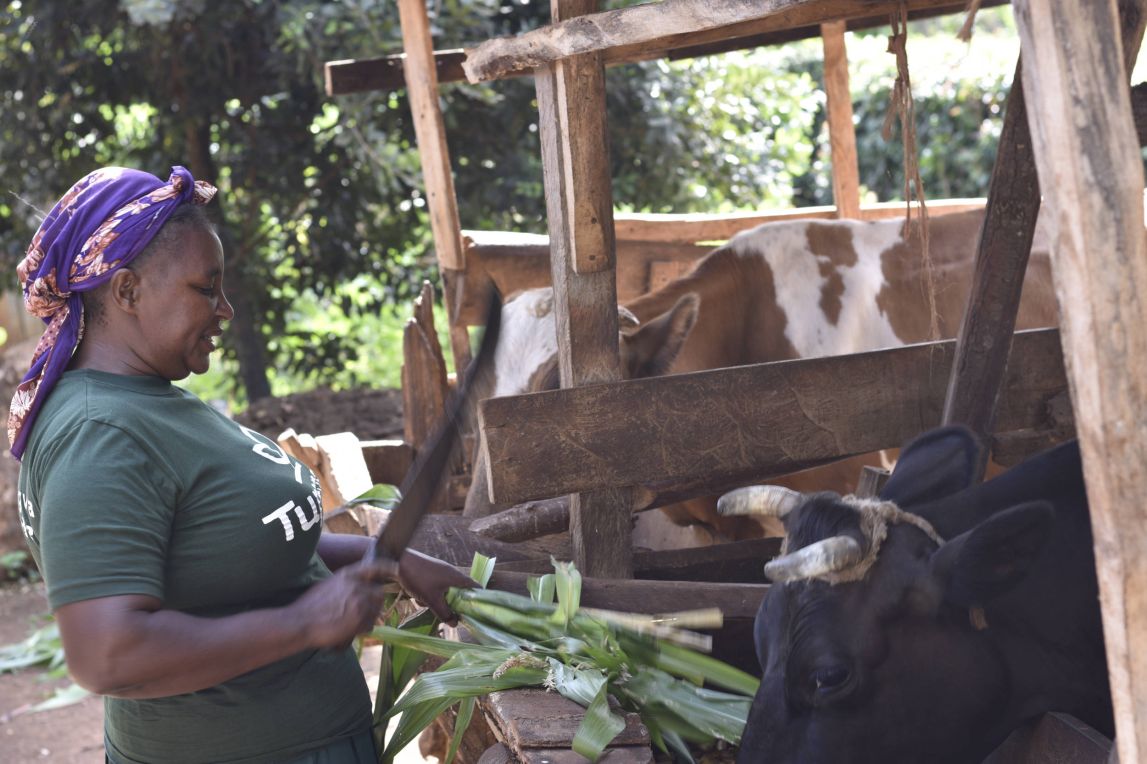
Eunice Nguu, a farmer from Kerugoya, Kenya, has embraced diversification. Her one-and-a-half acre plot of land now includes a wide range of One Acre Fund crops, including maize, beans, vegetables, macadamia nuts, and avocados. She also rears chickens and cattle and, since 2021, manages a tree nursery.
“I always want to improve – for my family and community. I ask myself, ‘How can I make the most of what I have to improve my livelihood?’” –– Eunice Kerugoya
In Tanzania, this year we expanded our crop portfolio to include sunflowers, potatoes, and beans, as well as 15 timber and fruit tree species, helping farmers to boost and diversify their impact.
“I decided to plant sunflowers this year after learning that sunflowers are drought resistant and produce high yields. Later I can use this as a safety net if things do not work out well well on the side of maize,” says Rehema Kihalalwa from Iringa, Tanzania.
Commitment 2: We are actively tackling soil degradation.
Land is a farmer’s most important asset, yet many areas One Acre Fund serves are showing signs of long-term degradation. Average land size per household typically decreases over time due to generational subdividing, meaning farming intensity increases to compensate, often resulting in erosion-prone and nutrient-stripped soil.
To renew soil capacity to support optimum plant life, we train farmers on practices such as compost, mulching, and land management that replenish and maintain soil fertility; healthy soil engenders healthier crops, and helps buffer against droughts and floods alike. “Last year, running water devastated hundreds of maize and potato fields, as rivers burst their banks. One Acre Fund came to teach us contouring techniques to fight erosion.
"The whole community was mobilized to build contour lines on Masare, the mountain whose waters destroyed our crops” — Oscar Nibumona, farmer from Nyarusange, Burundi.
In Tanzania, we collaborated with the government to conduct soil testing for thousands of farms. “We learned that knowing the physical properties of soil, with its exact nutrient composition, is critical to a healthy crop production system,” says farmer Clemence Mdamu from Wang’ing’ombe, Tanzania. “It would enable me to spend less and earn more by eliminating unnecessary fertilizer expenditure.”
Commitment 3: We are encouraging tree planting to restore and increase environmental health and build farmer resilience to climate and income shocks.
One Acre Fund has found that smallholder agroforestry offers one of humanity’s most powerful levers for large-scale climate adaptation and mitigation. Trees cost little to plant and maintain, yet steadily accumulate value as they mature, allowing rural families to build a reliable and climate resilient asset base that can be sold (and replanted) in difficult crop seasons. Farm-level tree-planting simultaneously unlocks diverse environmental benefits, sequestering CO2, controlling erosion, and reducing deforestation pressure on primary forests. In 2022 alone, One Acre Fund equipped 2.8 million farmers to plant 62 million trees of over 45 species.
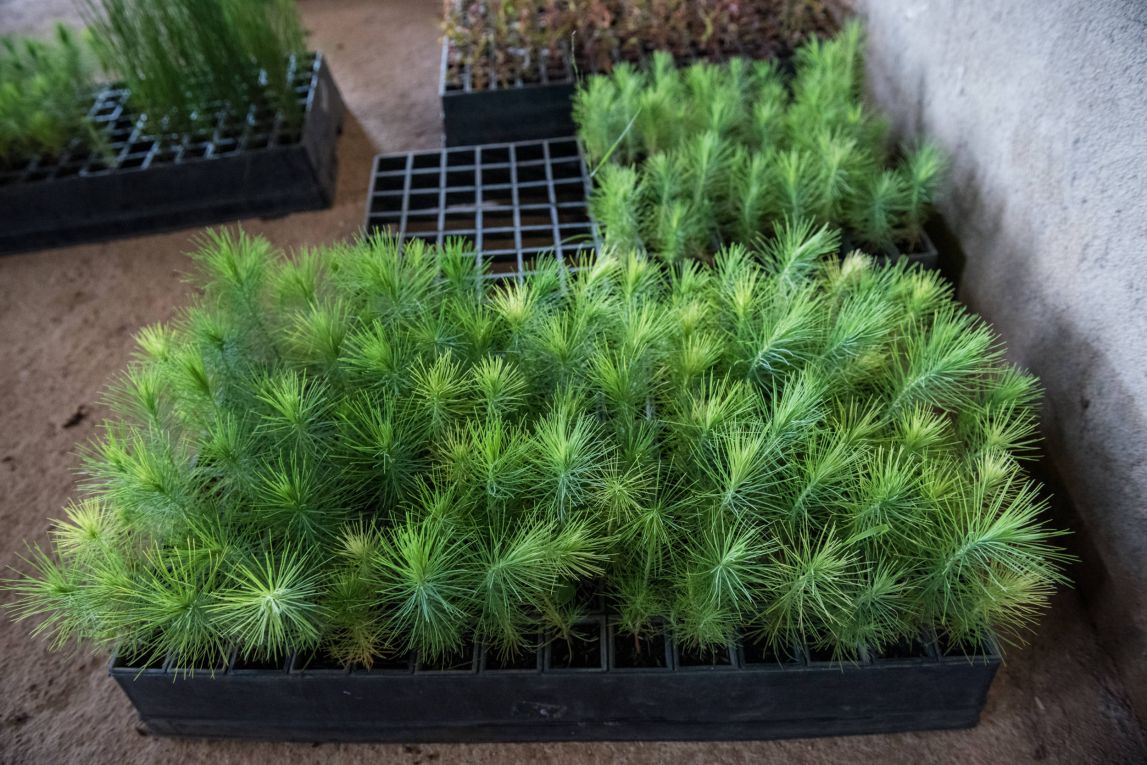
For Oscar in Burundi, trees don’t only offer income potential - they’re also restoring and protecting his farmland.
“One Acre Fund has also helped us set up several tree nurseries. Each family receives trees that they grow on their farms. We planted trees around the mountain, and overflowing water is no longer a threat; our soils have also regained fertility. The change is evident, fields are incredibly green, and I am positive I will harvest three times more than the last season,” — Oscar, Burundi.
Eunice in Kenya is happy that she is building a sustainable legacy for her children and community through her tree nursery. “Demand for trees has soared, and I have had to request additional sockets to keep up with seedling production – we will produce well over 200,000 seedlings this season. I have ambitious plans, and I believe with One Acre Fund as my partner, I can achieve my plans and much more,” Eunice says.
Commitment 4: We are building safety nets to income and livelihood shocks.
The commitments above equip farmers with a strong first line of defense against the effects of climate change – yet true resilience also requires a “safety net” of protection against catastrophic events. One Acre Fund is the largest aggregator of farmer insurance in Africa, bundling basic yield indexed coverage into farm input loans for about 90% of our full-service clients. This coverage provides a mix of payouts, loan forgiveness, and/or re-distribution of inputs in the case of external shocks.
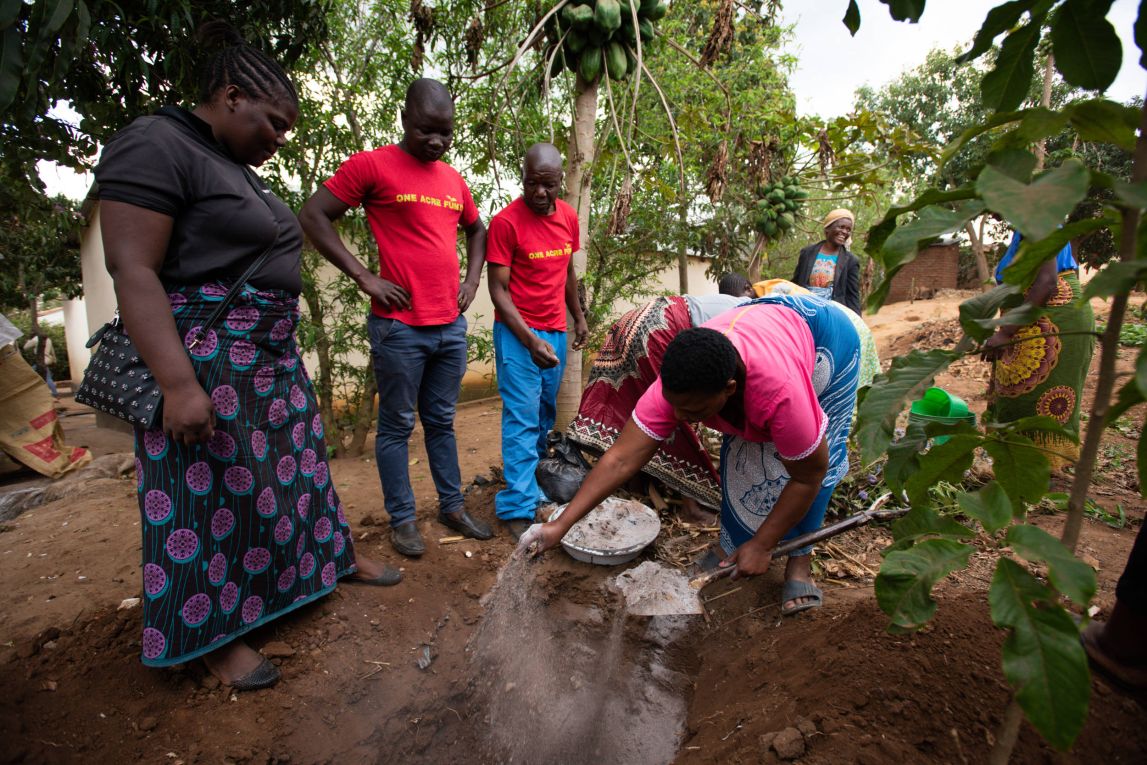
“It’s really helpful to receive this support. If we hadn’t gotten it, we’d have even less than we do now, particularly when I compare myself to farmers who don’t farm with One Acre Fund, who didn’t get additional seed to replant,” says Rose January, whose maize suffered during a recent drought in Malawi. “I harvested fifteen 50kg bags — I used to get about three before joining One Acre Fund. If I had just three bags of maize this year, I wouldn’t sell any of it; my kids wouldn’t go to school because couldn’t pay for it.”
We are currently exploring options to deepen the level of coverage we can provide farmers. Over the last few years, One Acre Fund has trialed a more extensive self-insurance product in Malawi; after Cyclone Ana devastated parts of southern Malawi in 2022, we provided financial assistance and loan relief to more than 4,000 farmers enrolled in our program.
“The insurance was impactful because my field was completely washed away. If the loan wasn’t reduced, I wouldn’t have finished paying it and couldn’t enroll next year” — Esther Masambuka, Malawian farmer.
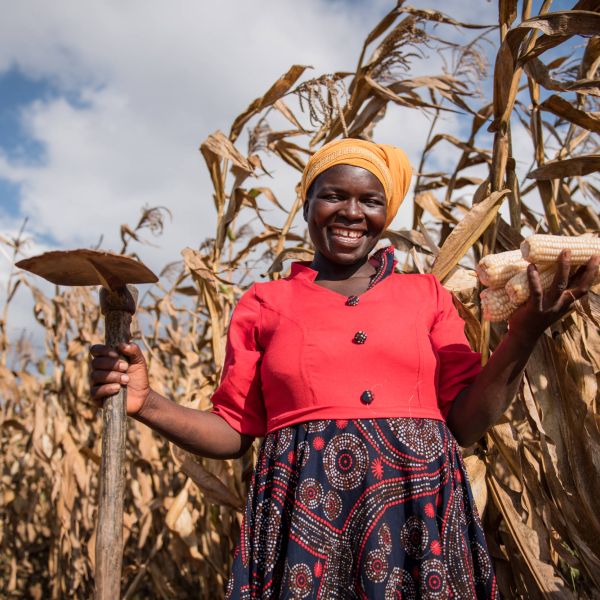
Learn more in our annual report
Our 2022 Annual Report takes stock of our work in growing farmer impact, building resilience, and delivering sustainable livelihood changes. Read report
